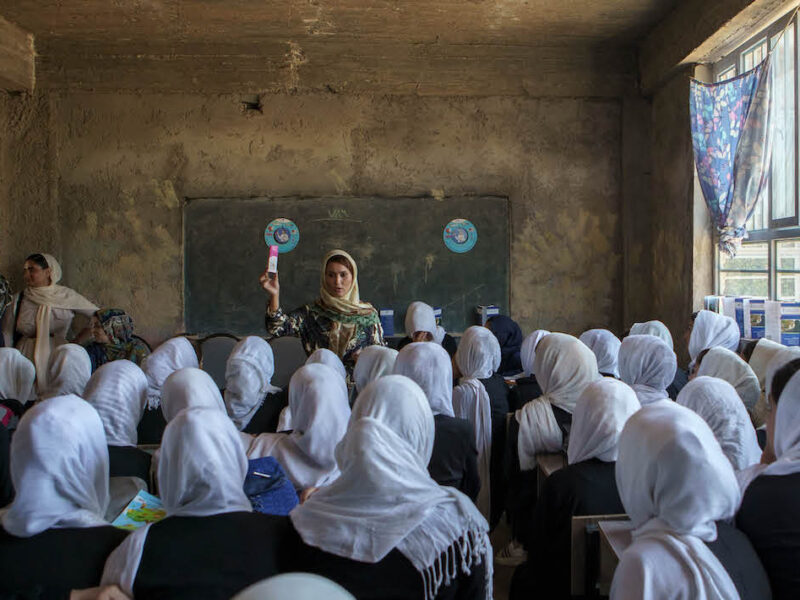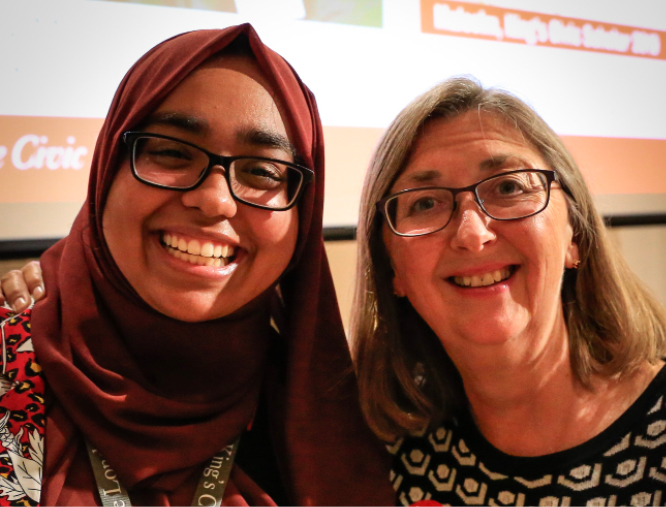
In this issue
Supporting Afghan women to continue their education: Sanctuary Spotlight
Since the Taliban returned to power in 2021, gender-based discrimination against women and girls in Afghanistan has worsened. Jane Conway...

Monument of Motherland: a famous Ukrainian symbol of independence
Read time: 4 mins
Gérald Sigrist (MA War Studies, 2017) was faced with a choice: to either focus his energy on his work as a Security and Access Coordinator in Ukraine, or find the time to do this job while also mentoring a King’s student. After deciding on the latter, Gérald was hand-matched with fellow French national Elise Amary (MA Intelligence & International Security, 2023), and their long-distance mentorship began.
We spoke to Gérald and Elise about their experience of participating in mentoring – what they gained from the experience and how Gérald managed to maintain his mentoring commitments while working in Ukraine during the conflict.
Elise, like many students approaching graduation, was looking for support in her post-university life: ‘I really wanted the opportunity to get to know King’s alumni,’ she remarks. ‘I was looking forward to getting tips on the professional world, on gaining confidence and asserting oneself, and on how to capitalise on one’s skills, experience and knowledge.’
Elise’s quest to answer these queries led her to the King’s Leadership Mentoring Programme, through which she was assigned Gérald as a mentor. ‘Mentoring is important so we can leverage the potential of the King’s community – it can help graduates start their professional career and build ties with other alumni,’ explains Gérald.
Many alumni benefit from being able to participate in mentoring remotely; this was certainly the case in this instance, as Gérald is currently working in Ukraine as a Security and Access Coordinator. In this role, Gérald supports humanitarian activities in several ways: by assessing risks and devising mitigation measures for his teams to access and operate safely in frontline areas; by briefing and training staff joining the mission to ensure their mental and physical wellbeing; and by providing crisis management support in case of any security risks that affect staff and their activities.
Despite the pressures inherent to his job, Gérald was able to see the benefit to both him and Elise of pursuing the mentoring relationship: ‘The particular intensity of my first few months on the job during a winter of air attacks on Ukraine initially left me little time and mental space to commit to mentoring,’ admits Gérald. ‘I then realised that this experience, however challenging, could be valuable to share with Elise, as it serves as an example of the type of responsibilities one can assume after a War Studies degree from King’s, and the very practical implications of such a career path. I also found that mentoring could be a healthy way to focus my mind on something other than my personal work-related preoccupations.’
The remarkable resolve shown by Gérald to persist with mentoring – the very embodiment of the ethos of King’s to build a better world through service to society – proved to be ‘an utterly enriching experience’ for Elise. Gérald was able to understand her questions regarding the search for employment in the UK as a French national, as well as the queries she had about finding work internationally. ‘I always felt like he was actively listening to my concerns and looking for solutions or pieces of advice, which made me feel appreciated and respected,’ adds Elise.
Gérald found the experience enriching too, learning through his participation in mentoring that the process was positively affecting his view of his work in Ukraine. He discovered that his involvement made him ‘more conscious, and proud of my achievements as I explained how I got there. It also gave me more energy and motivation to keep challenging myself, to question what I really want to achieve and make the best possible use of my skills and experience in the context of the Ukraine crisis.’
Gérald’s mentorship also gave Elise access to Gérald’s network. In situations where Gérald felt somebody else was better placed to answer a question that Elise had, he would put her in touch with that person directly. Over the course of his mentorship, Gérald introduced Elise to four contacts who advised her on queries regarding military intelligence, security in the private sector, international organisations and the preparation needed for senior French civil service exams. Gérald encourages other mentors to introduce their mentees to their network – a position Elise supports, commenting that being able to speak with Gérald’s contacts was a highlight of her mentoring experience.
Alongside Gérald’s advice to mentors to be generous with their contacts, he also suggests that mentors should view the experience as mutually beneficial: ‘You stand to gain a lot from mentoring. You are growing your network by connecting with promising graduates who will play leading roles in your sector in the coming years; you are exercising your mentoring and talent development skills; you are reflecting on your own progression and feeling the communicative energy and enthusiasm of young graduates.’
And should students and alumni sign up for mentoring opportunities at King’s?
‘Absolutely go for it,’ exclaims Elise. ‘Be curious to meet new people and connect with them truthfully. It’s a rare opportunity for growth and connection and something that will remain after you leave King’s. It’s not only about discussion, but also about getting to know yourself more and giving something to someone else too.’
Perhaps you remember certain people who gave you career advice, introduced you to new connections or simply just listened to your concerns. By mentoring with King’s, you could help a student or graduate reach their potential too. To find out about all the ways that you can get involved in mentoring at King’s, visit our mentoring webpage.

Since the Taliban returned to power in 2021, gender-based discrimination against women and girls in Afghanistan has worsened. Jane Conway...

Marjana Ahmed (Biochemistry, 2021) and Allyson Jones (Biochemistry, 1983) met at the Civil Leadership Academy launch event.